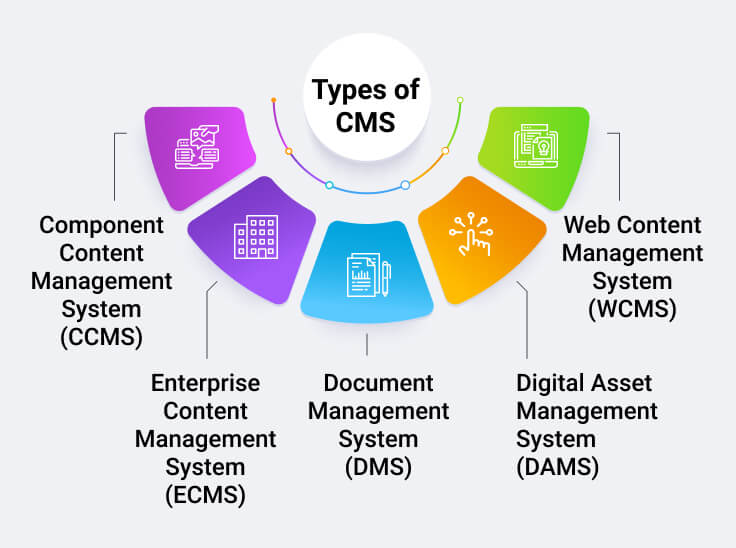Content Management System (CMS)
The term ‘Content Management System (CMS)’ has gained popularity in recent years. Actually, it has spread like a fire in every industry. In simple terms, the basic definition of Content Management System (CMS) is given as:
‘ A software or a system used to manage, store and distribute an organization’s content ‘
CMS provides abundant benefits for all types and sizes of businesses. It offers cost-saving, flexibility, control over the content, and increased collaboration among the team members.
But, the key to getting the most out of a CMS platform is to choose the right one. Thus, understanding all the different types of content management systems can help you choose the best option that fits your business.
Types of Content Management Systems (CMS)
Though the term is blur over the years while explaining different kinds of platforms, Most CMS will fall under these 5 categories. Here are all the types of content management systems.

Component Content Management System (CCMS)
A component Content Management System or CCMS is a unique and special type of CMS compared to traditional CMS. CCMS stores the content at a deeper level (component) rather than at a document level.
The Component Content Management System (CCMS) manages content by components instead of organizing content by pages. These components can be paragraphs, photos, phrases, or even a word.
CCMS is a type of CMS platform designed to maximize the reusability of the content. In order to do that, components are only stored once in CCMS. Besides that, it also acts as a source to let you publish content across multiple platforms such as mobile, Print, PDF, and much more.
Advantages of Component Content Management System (CCMS)
- Reusability
The reusability of content in CCMS saves a lot of time, effort, and resources required to write and publish the content.
- Transparency
CCMS offers complete transparency over the content. As a result, every user can see the content available in CCMS.
- Traceability
Detailed Tracking of content and its related activities is possible in CCMS. Therefore, you can track who made the changes, when, and where.
- Omnichannel Publishing
CCMS is a type of CMS that lets you push content to multiple channels, including web, chatbots, mobile, print, and more.
- Improved Collaboration
CCMS improves the workflow and helps in collaborating with the technical as well as non-technical teams.
Examples of Component Content Management systems are Paligo, Documentum, Author-It, and Xyleme.
Enterprise Content Management System (ECM)
Enterprise Content Management or ECM is a type of CMS system that allows an enterprise to generate, manage, and distribute different types of content. Also, it ensures that the information and documents get delivered to the right audience. This audience may be an employee, executive, business partner, or customer.
With ECM, employees can get easy access to the stored content required to complete their tasks. In addition, an ECM automatically deletes files after the retention period to free up unnecessary occupied space.
Advantages of Enterprise Content Management System (ECM)
#1 Improved Efficiency
The management of documents is taken care of automatically. Therefore, users can focus on creating content and be more productive.
#2 Flexibility
ECM lets you store content in any type of file or format and have it processed automatically.
#3 Cost-Efficient
Enterprise Content Management is cost-effective as it stores only the necessary files and deletes the rest.
Examples of Enterprise Content Management Systems are Zoho Docs, eFileCabinet, DocuShare, and Box.
Document Management System (DMS)
The era of paper-based documents has vanished. whereas, managing data on paper was a thing of the past.
Now, Document Management System (DMS) offers an eco-friendly solution to manage, track and store documents in the cloud. Basically, it is an automated CMS solution for uploading, processing, and distributing documents without worrying about printing and scanning.
Advantages of Document Management System (DMS)
#1 Environment Friendly
DMS is an eco-friendly CMS as it saves paper by storing content in digital format.
#2 Security
DMS has multiple levels of security to assure that confidential data of the organization remains in safe hands.
#3 Mobile/Remote Operability
DMS allows you to access documents from remote locations, even from mobile devices.
Examples of Document Management systems are Google Workspace, Dropbox, OneDrive, and iCloud.
Digital Asset Management System (DAMS)
A Digital Asset Management System, also known as DAM or DAMS, allows you to create, manage, store, organize and distribute digital assets. A DAM provides a centralized library from where an employee, client, or contractor can easily access the content.
In the early days, DAM was only used to store media files such as photos, videos, and audio recordings. But now, it has a large variety of formats, including logos, font, documents, and much more.
A Digital Asset Management System is cloud-based so that users can access documents and content from anywhere.
Advantages of Digital Asset Management System (DAMS)
#1 Centralized Library
DAMS stores the content in a centralized repository which makes it easy for multiple users to access it.
#2 Third-Party Publishing
With DAMS, you can publish content to third-party distribution services, portals, social media channels, and much more.
#3 Brand Management
Managing content and brand portals are easy for the users by utilizing the features of DAMS.
Examples of Digital Asset Management systems are Brainfolder, Bynder, Canto, and MediaValet.
Web Content Management System (WCMS)
A Web Content Management System (WCMS) is a particular type of CMS solution specifically created for websites. WCMS lets you manage the digital components of a website without having prior knowledge of programming.
Web Content Management System provides authoring, collaboration, and administration tools to manage web content. Unlike other CMSes, WCMS does not deal with any other format of content other than web content.
Advantages of Web Content Management System (WCMS)
#1 Automation
WCMS publishes content automatically, which saves a lot of time and improves workflow management.
#2 Scalability
With the help of WCMS, business owners can scale their companies without worrying about the limitations of the website.
#3 Personalization
WCMS is a type of CMS that allows you to customize your website with highly personalized content and design.
Examples of Web Content Management System (WCMS) are Hubspot, WordPress, Webflow, and Duda.
Apart from these five different types of content management systems, there are a few other types of CMS as well. They are classified based on the way they are embedded into your systems. These other CMS are:
- Open-Source CMS
- Proprietary CMS
- Cloud-Based (SaaS) CMS
- Headless CMS
- Custom CMS
These CMS types can be considered as sub-categories of actual CMS.
Why prefer Headless CMS over other CMSes?
According to Hubspot, more than 70% of organizations are investing in content marketing and it is a crucial part of their marketing strategy. Whereas, the modern-day customer experience requires a scalable, flexible, and highly customizable CMS.
This is where Headless CMS comes into action. In comparison to traditional CMS, Headless CMS helps you to cut down the delivery time through quicker iterations.
A headless CMS allows you to change content and database without integrating the frontend (Presentation Layer). Once the content is created, it can be distributed to mobile, smart devices, IoT devices, tablets, websites, and other channels.
Business Benefits of Preferring Headless CMS
There are several benefits of choosing headless CMS over other types. Some of them are:
Flexibility
Headless CMS allows you to develop your own presentation layer. It also lets you pick any development language and operate through APIs.
Apart from that, it offers limitless integrations and reusability of content as it does not have any fixed code structure. Thus, headless CMS is completely flexible.
Omnichannel Marketing & Selling
Headless CMS has the capability to provide a consistent customer experience across multiple touchpoints. It lets you create iconic content and deliver it to multiple channels.
Future Ready
Headless CMS makes you ready for the future of marketing. It can adapt to every new and trending technology as the presentation layer is kept separate from the data and logic layer. Also, there would be no requirement to make technical changes at the time of rebranding channels.
Cost-Effective
Headless CMS is one of the most cost-effective solutions as it requires very minor changes to create new functionality. As a result, the upfront cost is reduced to a great extent.
Better Software Architecture
The architecture of Headless CMS is decoupled from the backend and the published content. This results in better security and workflow management. Thus, when a CMS application somehow gets offline, it won’t affect web applications.
Resource Saving & Utilization
When dealing with headless CMS, organizations do not require a large team of CMS specialists. That adds up in reducing a lot of resources and its cost.
Focus On Business
Headless CMS does not take away your attention from growing your business. It is easily manageable and lets you focus on high-priority tasks instead of managing the CMS system.
Security
Last but not the least, security is one of the major factors to choose headless CMS. It has multi-layered cyber security which protects the confidential data of an organization.
Conclusion
The actual results can be quite messy from your expectations if you choose the wrong CMS for yourself. Selecting the right CMS depends on understanding what type of work each CMS is Suited to do.
Therefore, the initiative to choose the right CMS should begin with thoughtful, intentional, and a clear set of requirements.
At OpenXcell, we help you determine which type of content management system is best suited for your business. We are here to provide Content Management System (CMS) customizations. Along with that, our obsession with quality reflects in our personalized services and support. So, contact us for suitable CMS and other CMS-related services.
Also Read:








